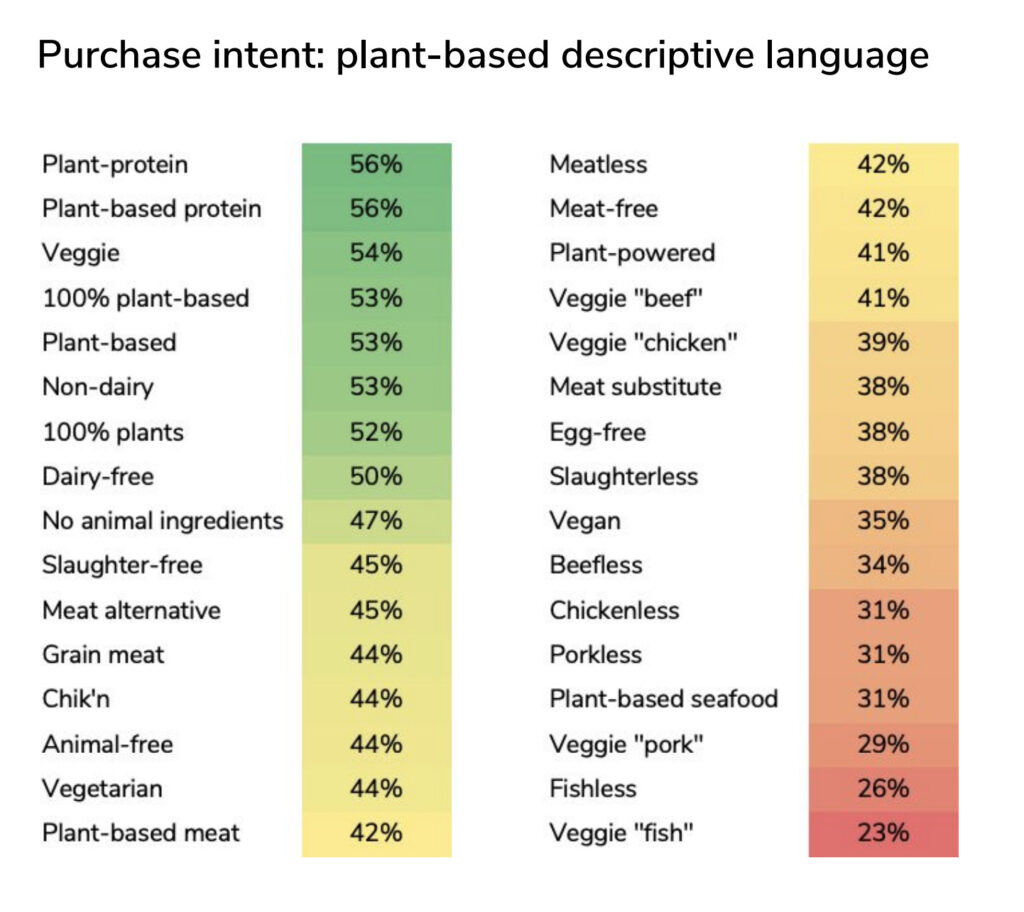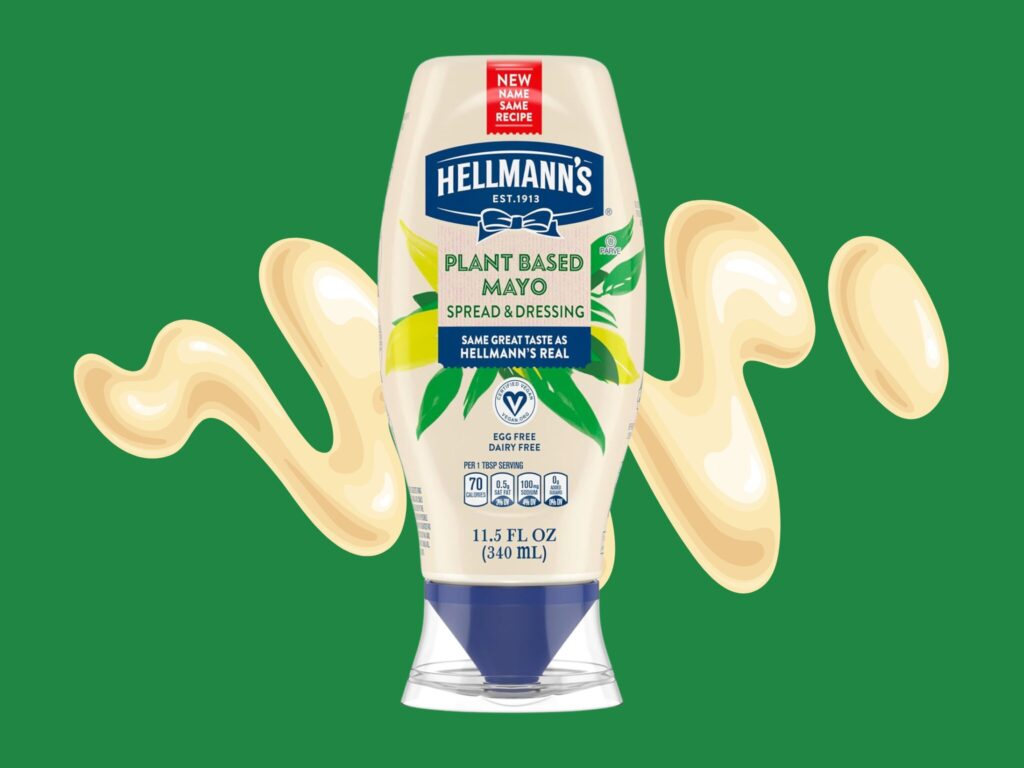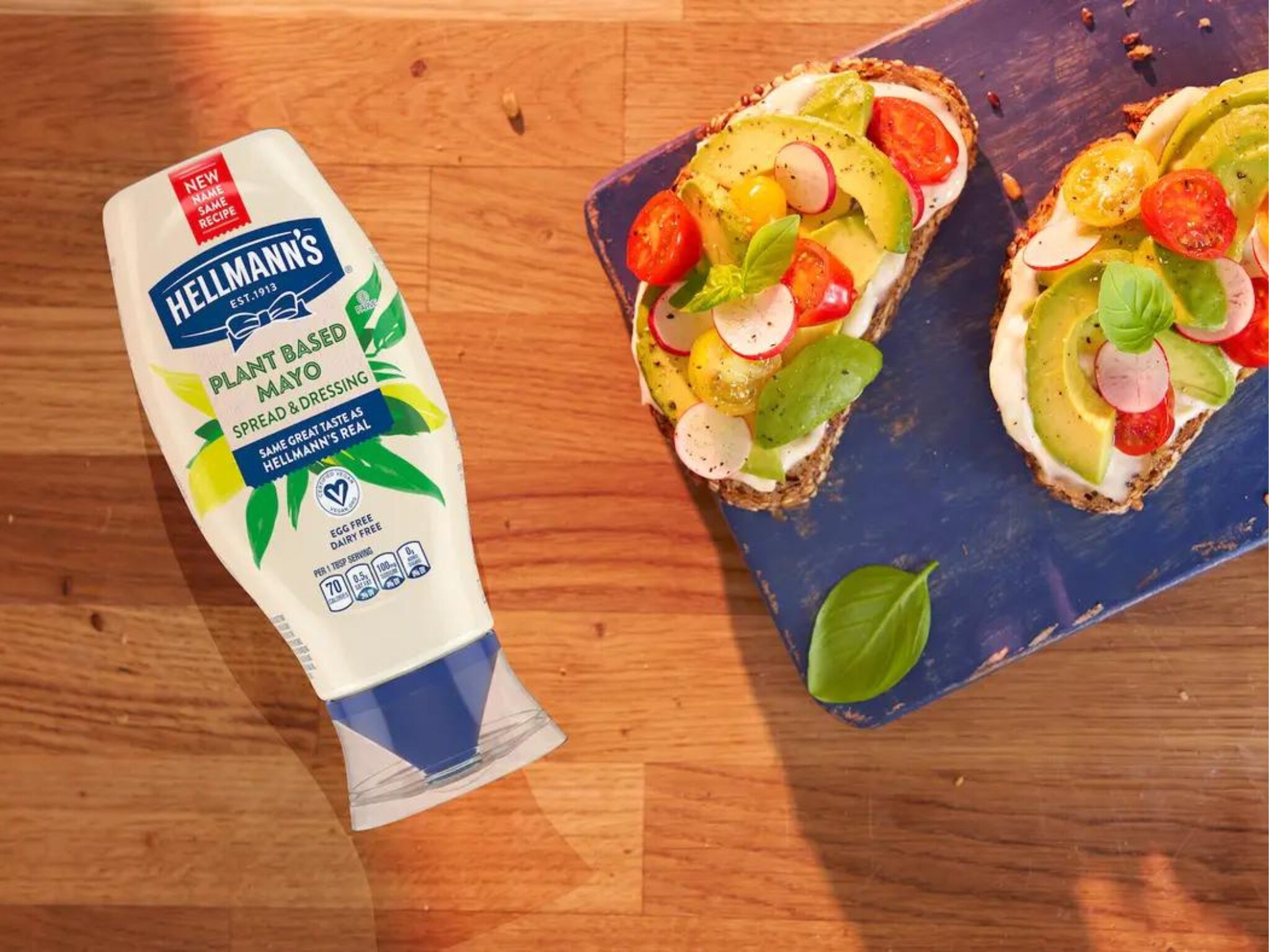Is Hellmann’s Plant-Based Mayo Rebrand Proof That ‘Vegan’ Labels Hamper Sustainable Sales?
5 Mins Read
Hellmann’s has made a big splash by rebranding its vegan mayo to appeal to flexitarians, in a sign of the influence of labels on sustainable food purchases.
In the UK, Hellmann’s egg-free mayonnaise is no longer labelled ‘vegan’, with the Unilever-owned brand opting for ‘Plant Based Mayo’ as a way to become more “inclusive” to flexitarians.
The relaunched spread – which first appeared in the UK market in 2018 – now comes with a new recipe and redesigned packaging in a move that aims to solve multiple pain points at once: food waste, health concerns, and label barriers.
The decision to drop the term ‘vegan’ from packaging is a conscious one, with the brand saying there was “considerable headroom for growth” in the vegan mayo world, “particularly from consumers who want to cut back on animal-based products without becoming fully vegan”.
Currently rolling out across UK supermarkets, the new mayo now also has less rapeseed oil (down from 72% to 52%), supplementing it with a seemingly lower amount of sunflower oil. Plus, it now has xanthan gum.
Hellmann’s leans into vegan labelling research

Explaining its reasoning, Hellmann’s said its consumer research has shown that “the word ‘vegan’ can be a barrier for flexitarians, who see ‘plant-based’ as more inclusive”.
This chimes with a plethora of other studies on sustainable food labelling. In 2019, analysis by alternative protein think tank the Good Food Institute found that terms like ‘100% plant-based’ and plant-based (both 53%) are much more appealing to consumers than ‘vegan’ (35%), which was amongst the least effective ways to label vegan food.
Similarly, an oft-cited study by the University of Southern California last year – covering 7,341 people – used gift baskets as a gauge for which labels work. Participants were asked to choose between a vegan and non-vegan food basket, with the former being labelled in five different ways.
Only 20% chose the ‘vegan’ gift basket over the meat and dairy one, while 27% picked it when labelled ‘plant-based’. However, describing them with impactful attributes represented a significant upturn: when marked as ‘healthy’, 42% went with the vegan basket, while 43% did so for those tagged as ‘sustainable’ or 44% when labelled as both ‘healthy’ and ‘sustainable’.
This is why phrases like “100% sustainably sourced oils”, “free from artificial colours and flavours”, and “good source of omega-3” are prominent in Hellmann’s messaging around the rebranded Plant Based Mayo.
Vegan giants like Impossible Foods and Eat Just have also been using terms like ‘meat from plants’ and ‘made from plants’ for their meat and egg analogues, respectively. In fact, the latter simply labels its relaunched vegan spread as ‘Just Mayo’ to attract flexitarians, who hold the key to success for plant-based food manufacturers.
But when the world’s largest mayonnaise brand – a subsidiary of one of the biggest CPG companies globally – bids adieu to the word ‘vegan’, it’s a telling reminder that labelling matters. Hellmann’s plant-based sales have been growing for four consecutive years, so for Unilever to make the change, it’s an indicator that ‘vegan’ wording may be blocking the full potential of climate-friendly food sales.
Since the company is aiming to reach €1.5B ($1.6B) in annual sales from plant-based products in categories that would have traditionally used animal-derived ingredients by next year, targeting flexitarians with its Plant Based Mayo is a shrewd move. In a similar move, its latest non-dairy ice cream is branded as Magnum Chill Blueberry Cookie, a departure from the Magnum Vegan moniker.
Redesigned packaging leaves less Plant Based Mayo in the bottle

The announcement accompanied a change in the egg-free mayo’s packaging, part of the brand’s long-standing efforts to cut food waste. Debuting in the UK and Ireland later this year, the new squeeze bottles are now lined with an edible plant-based coating that prevents the mayonnaise from sticking to the sides and minimises the amount left over after the spread is used up.
“We know consumers want to be able to squeeze out as much product as possible – it’s an important cost and value benefit,” Krassimir Velikov, senior science and programme leader at Unilever, said of the new “easy-out” technology. “Some of the ingredients used in the plant-based mayo presented us with specific challenges, as they made the mayo more prone to getting stuck in the bottle. Correcting this issue involved creating an edible, vegan coating that would prevent this sticking problem by making the inside of the bottle more slippery,” he explained.
“We had to make sure that this ‘easy out’ coating hit a balance that would achieve the desired ‘easy out’ effect without interacting with the product. Even a slight change could make an enormous difference. For example, a tenth of a percentage increase of the plant-based ‘egg’ could add a full 15g leftover portion to the waste.”
Velikov added that by minimising the leftover mayo, the tech helps keep its bottles – which are “made with 100% recycled plastic where technically feasible” – in the recycling process. “If they exceed the maximum weight threshold needed, they will be rejected for recycling. By helping consumers to leave less mayo in the bottles, we in effect help them recycle more successfully,” he said.
Hellmann’s has a commendable record with food waste, having launched a Make Taste, Not Waste campaign in 2018 to fight this issue. Its research shows that 59% of consumers feel brands have a role to play here, especially since food waste accounts for 8-10% of global emissions.
The mayo maker’s food waste initiatives have involved a four-week-long Fridge Night challenge, dedicated Super Bowl ads for the last four years, a partnership with Ogilvy for use-what-you’ve-got recipes, a Smart Jar that revealed hidden messages when placed in fridges at 5°C or lower, a Meal Reveal tool to provide recipe ideas from what people have in their fridges, and a collaboration with Italy’s ID.Eight to launch a collection of sneakers made from food waste.
That said, Unilever itself is walking back on several of its climate pledges, including abandoning its goal of cutting food waste in its operations by 50% by 2025. Its commitment to roll out carbon labels on the packaging of all 75,000 of its products by 2026 seems to be forgotten too. “It is possible that some of our brands may wish to communicate product carbon footprints in the future, and for this having accurate data is essential,” a company representative told Green Queen in April.
“We also know information must be provided in context to be meaningful to consumers,” they added, outlining that the business was “committed to improving transparency of GHG emissions” in its value chain. “Our collection of more accurate data will help Unilever to make more informed procurement decisions as we work towards our climate targets.



